This leaflet will be studied by political scientists for years to come as a text book example of how to lose a referendum, what a gift to independence campaigners like myself, that the opposition should hand us one concise summary of all their main arguments to knock down one by one. Just crit these 10 pages of text, sentence by sentence and we’ve won the argument! Easy. Here we go:
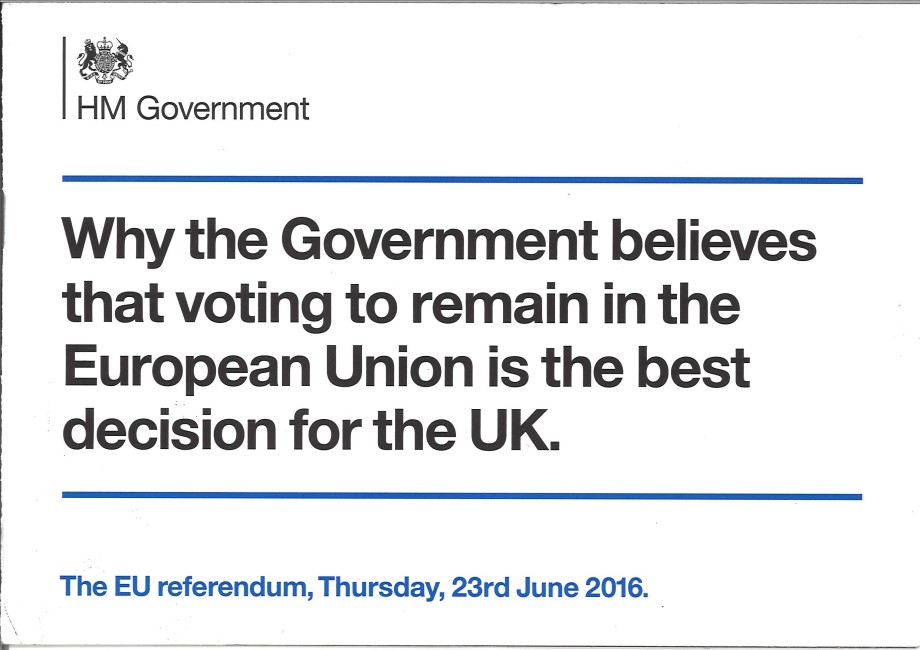
The deception begins even before the first word. Why is the insignia of our government at the top of this page? The cabinet is not bound by collective responsibility on this issue, and the government do not collectively endorse it. Sure the Prime Minister and Chancellor endorse it, but the Justice Secretary doesn’t, the Commons Leader doesn’t, the Employment Minister doesn’t, the Culture Secretary doesn’t, the Northern Ireland secretary doesn’t, and neither do a majority of the governing party. Graphic designers call these emblems ‘Powerful Endorsement Signifiers‘ and they are used to give rhetorical weight to messages, but it is disingenuous for half of the Tory party to claim to speak for the entire state. A more honest approach would have been to have featured a picture of the Prime Minister as its his deal he negotiated we’re voting on. Why do you suppose they didn’t go for that?
Next, this emblem contains an image of a crown and appears next to the text ‘HM Government’ HM stands for ‘Her Majesty’ … so it’s ok for one side to politicize the monarchy and claim royal endorsement, but not the other?
‘Why the Government believes that voting to remain the European Union is the best decision for the UK‘
Straight away we see the contradiction that runs through the whole booklet – it is designed to resemble objective impartial public information, but the actual content is nakedly partisan. At the bottom of the page we are told the referendum is on June 23rd. More on that later.

Page 2, column 1. Low turnout favours independence because Brexit voters are more highly motivated to vote, that’s why at every opportunity this leaflet will seek to ramp up the hysteria to motivate its supporters, hence phrases like ‘It’s a big decision. One that will affect you, your family and your children for decades to come’ I agree it’s a big decision but notice the emotive reference to ‘your children’? They’re trying to induce anxiety, they want a spasm of fear because they don’t believe cold calm reason will win this for them.
Page 2, column 2
‘The UK has secured a special status in a reformed EU’
What aspects of the EU have been reformed then? Name them. Nothing has been signed or confirmed. Certainly no treaty has been changed, in fact many EU leaders have already said they won’t agree to any changes. Some countries may have to have their own referenda whether to accept them, and if we have already voted to remain, why should they accept changes? Within the EU there is no correlation between your votes and their power, so voters cannot remove failed rulers or reform failed policies, that’s why EU is fundamentally unreformable. The only special status that ultimately allows us to govern ourselves is called independence.
‘we will not join the euro’
Till when? If we remain there will definitely be renewed attempts by the EU to take control of our economy, and even if we don’t join the EU will continue to devise ways of getting Britain to bail out it’s failing Eurozone project as it did in the past, more than once.
‘we will keep control of our borders’
What control? Sure we have the right to look at people’s passports but if it’s an EU passport then 99.7% can come and go as they please. My personal opinion is that overwhelmingly immigrants are good decent people who come here to work – I’m not interested in race, just practicalities… 65 million people live in Britain but 450 million have the right to enter, soon with Turkey that will be 525 million. For the first time in human history vast numbers of people can quickly move from one country to another, consequently Britain’s population is increasing by about 800 every day. My point is that any state that makes no decision about the number of people it can accommodate has basically abdicated its moral responsibility to provide adequate health, education, welfare and housing. But all that is just my personal opinion which you are welcome to dispute. but what I don’t think can be disputed is that you should have a vote on it. Maybe an independent Britain would vote for more immigration, maybe less, my opinion on that is unimportant, the actual number is quite important, but what is hugely important is the way its decided. Unsurprisingly Cameron assures us he’s struck a terrific deal, but that’s irrelevant, it should be the voters telling him the policy, not the other way round!
‘the UK will not be part of further European political integration’
Till when? Till European judges rule that under the Lisbon Treaty all aspects of our daily lives are subject to QMV, effectively abolishing sovereignty.
‘there will be tough new restrictions on access to our welfare system for new EU migrants’
These restrictions need to be asked for and agreed by all other members before they are applied, and if we have already voted to remain, why would other countries agree for us to cut benefits to their citizens? And if they don’t ratify Cameron’s deal, what are you going to do about it? The answer is nothing because you will never again be able to use your vote to control how your governors exercise power.
‘we have a commitment to reduce EU red tape‘
This statement is essentially meaningless and merits no response.
Generally these points are all about slowing things down, nothing about getting powers back as Cameron promised, this shows how much influence he really has. Moreover, this column encapsulates the oxymoronic nature of Cameron’s philosophy: he espouses integration whilst claiming opt-outs are beneficial.
Page 2, column 3
This section repeats in bold that ‘the Government’ want you to remain. It claims to ‘set out the facts‘ and repeats (second time in two sentences) that the WHOLE government think you should agree with it that remaining is best. Curiously it then says this document also ‘shows some of the choices the UK would face if there were a vote to leave‘. Don’t hold your breath for an impartial assessment.

Page 3
This picture reminds us of the vote date (again) and repeats (again) how important it is. This is the third time in three pages this booklet has told us the date of the referendum. This is because the establishment are shitting bricks that people might not be wildly enthusiastic about voting for external rule. Cameron chose the 23rd because it’s one of the longest days of the year, but unwisely chose a date when thousands of young people head off to Glastonbury, oh well, he obviously doesn’t care about what they think. He will be praying it doesn’t rain.
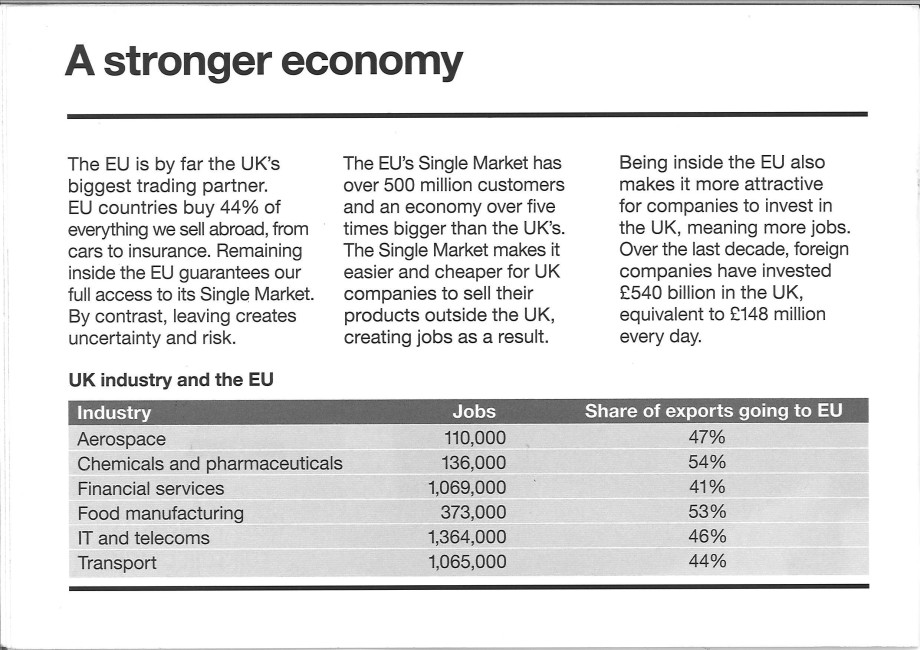
Page 4, column 1
‘The EU is by far the UK’s biggest trading partner. EU countries buy 44% of everything we sell abroad from cars to insurance‘
1, if we leave the EU will charge the ‘Common External Tariff‘ but this only applies to goods and 40% of our exports to Europe are services, so Brexit would not affect 73.6% of exports.
2, the EU is a declining part of the world market, in 1980 it represented 30% of trade, today it’s 17%
3, Our trade with the EU is diminishing whilst our trade with the rest of the world is increasing, as this graph shows:

…but let’s take this point in good faith and agree that while diminishing, the figure is not insignificant…
Britain’s trade defect with the EU is at record levels. Last year we bought about £89 billion more of their goods and services than they buy of ours. £31 billion of that went to Germany. This gives us enormous leverage. They are in a financial crisis, we have money and they want to sell us stuff, the last thing the EU wants is to start restricting trade with the UK. German manufacturers especially, would be apoplectic if trade with Britain was impeded in any way.
‘Remaining inside the EU guarantees our full access to the single market‘
This sentence implies we should be scared of not having full access to the Single Market, but I wonder how many people reading this actually know the difference between a single market and a free trade area? A single market is like a free trade area in that there are no tariffs, quotas or taxes on trade, but also where there is free movement of goods, services, capital and people. A single market is basically a country but without the democratic control of power – it is the problem not the solution! But this sentence tries to trick you into thinking that a Britain free of the Single Market would be excluded from the trade area. Not true. Look at these tomatoes I bought recently from Sainsbury’s.

Spot the difference? that’s right, there’s pretty much zero difference, both packs cost me 90p, the only small difference is that one is from Morocco and the other from Spain. To assert that Moroccan farmers can sell tomatoes in the EU but we would be shut out is unrealistic.
“Ahh” say the Remainiacs, “we may be allowed to trade but we would be subject to punitive tariffs”
If you think trade tariffs are the most important thing in the world, then I have some very good news for you – they are in a death spiral, as this graph demonstrates.

The grey vertical lines refer to the new trade agreements – we are living in an age where lots of new trade agreements are being hammered out. And as more and more trade agreements are struck so the raison d’être for the EU evaporates – in the modern world we can all be part of a low tariff economic area without the hassle of having to merge our governments.
Lots of people who piss their pants about tariffs don’t actually know what a tariff is, and couldn’t actually say who pays it and who receives it. If I buy a Sony stereo from Japan, who pays the tariff? Indirectly, I do. Who receives the tariff? The British Government does. Sony is virtually unaffected by any tariff here, they are still selling the same stereo for the same amount of Yen, if there is a tariff it will make their goods marginally more expensive in one of the hundred countries they sell to, but that’s nothing more than a minor irritant for them. Now do you see why tariffs are dying out? Because they are self-harming. A government that implements high tariffs damages it’s own economy, increases inflation and makes its own people poorer! So if you think the EU would impose punitive tariffs against an independent Britain think again, that would be a self-defeating act of economic flagellation, as well as being illegal under WTO rules.
‘By contrast leaving creates uncertainty and risk‘
Uncertainty of what? Risk of what? Notice how the statements designed to induce paranoia are never actually substantiated by facts?
‘the single market makes it easier and cheaper for UK companies to sell their products outside the UK creating jobs as a result‘
No, employment is boosted not by our integration within the EU but our separation from it as the following facts clearly demonstrate.
Unemployment:
10.3% Eurozone
5.1% UK 2016
4.9% USA
4.8% Norway (non-EU)
3.7% UK 1972
3.4% Switzerland (non-EU)
3.4% Japan
3.1% Iceland (non-EU)
‘Over the last decade foreign companies have invested £540 billion in the UK, equivalent to £148 million every day‘
Not EU countries but foreign countries. Don’t be tricked into thinking the EU hands us £148 million every day, and why do countries invest here? Maybe it’s because we weren’t stupid enough to join the euro.
Who is the biggest foreign investor in Britain? The USA. Who is the biggest foreign investor in the USA? Britain. Are Britain and the USA in a political union? No. A political union and a free trade association are two different things. You. Don’t. Have. To. Join. A. Country. To. Trade. With. It.

Page 5.
‘Over 3 million UK jobs are linked to exports to the EU‘
And 5 million EU jobs are linked to exports to the UK. Millions of workers in China, Japan and North America also have jobs linked to exports to the EU, must they submit to EU Working Time Directive? Of course not! In the modern world you don’t need to be in a political union with a country to have a low-tariff trade agreement with them.
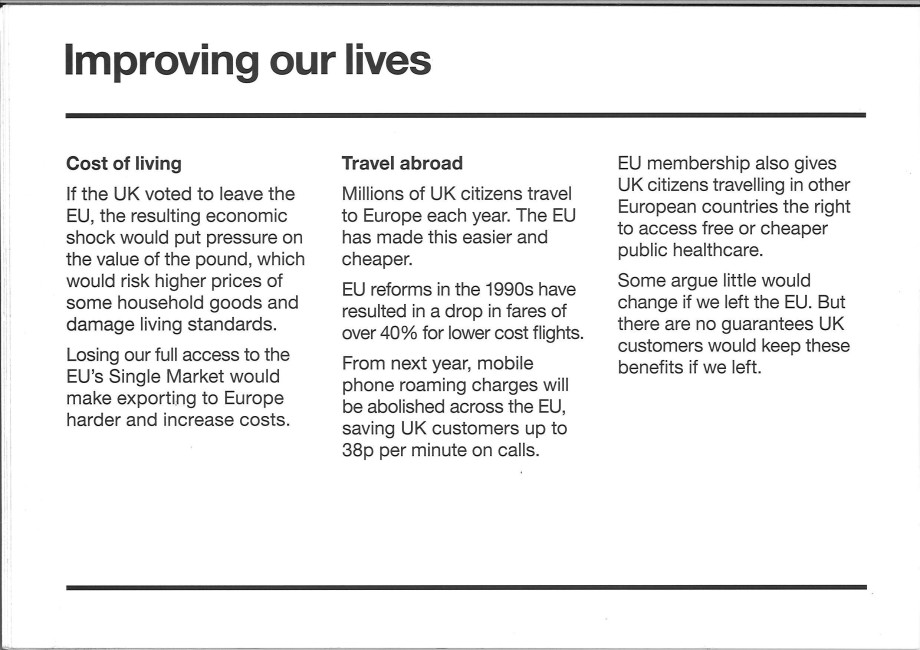
Page 6. Cost of living.
‘If the UK voted to leave the EU the resulting shock would put pressure on the value of the pound, which would risk higher prices of some goods and damage living standards‘
…More fact-free conjecture masquerading as technical information…When Sterling left the ERM it became a free-floating currency, constantly adjusting to the market level, consequently our economy didn’t stop growing for the next 20 years. Weak currencies benefit exporters, strong currencies benefit savers or importers – there are good and bad consequences of any currency fluctuation, but overwhelmingly the empirical evidence shows that countries that declare independence prosper, whilst subjects of external rule decline (as we see in the Eurozone today)
Furthermore professor Patrick Minford CBE professor of applied economics at Cardiff Business School has calculated that because prices tend to be higher within the EU, even without a trade agreement, there would be an 8% drop in the prices of consumer goods on day 1 of Brexit. And he is not the only economist to say that Britain would thrive outside the EU. Ruth Lea has, so has Irwin Stelzer, and Roger Bootle thinks the longer the time frame considered, the more the economic benefits of independence would accumulate. Additionally Thomas Piketty thinks the risks of Brexit are overblown and that it could shake the EU up for the better.
‘Losing our access to the EU’s single market would make exporting to Europe harder and increase costs’
Being outside the Single Market would be a good thing because the Single Market prevents nations from democratically governing themselves. Sure, being outside the trade area would be a bad thing, but that will never happen a because both sides benefit from trading with each outer. Another point to bear in mind is that effectively we are incurring trading costs right now – our £350,000,000 weekly membership fee. I’ve already shown you the graph of tariffs going down and down, well here is a graph showing our EU contributions going up and up.

It doesnt take a mathematical genius to work out that if trade tariffs are going down and down, and membership costs are going up and up, then eventually, somehow, paying the membership fee will become more expensive than paying the tariff. Has that point has been passed already? Maybe, maybe not, but in the long term there ain’t no maybe about it, ultimately it will be more expensive to pay EU contributions than trade tariffs.
Page 6, Travel abroad.
‘EU reforms … have resulted in a drop in fares of over 40% for lower cost flights‘
Travel has become cheaper globally, that’s not something exclusive to Europe. This is a standard EU tactic of claiming credit for every good change in the modern world irrespective of whether they contributed to it. And notice the phrase ‘40% for lower cost flights’? What flights exactly? Another cherry-picked pseudo-fact designed to confuse rather than enlighten.
‘…mobile phone roaming charges will be abolished across the EU saving UK customers up to 38p per minute…,
1, they’re being abolished globally anyway, besides I can send texts or email messages for free anywhere in the world already.
2, Woo! 38p!!! I would be happy to pay Vodafone a crappy 38p in exchange for being able to vote out shit leaders.
3, ‘up to 38p’ …. ‘up to’??? Could this be the second non-specific pseudo-fact in two sentences?
‘EU membership also gives UK citizens travelling in other countries the right to access free or cheaper healthcare‘
This is actually the problem, because it also means EU membership gives 450 million EU citizens the right to access our NHS for free. Britain set up a National Health Service, but this has now become an inter-national health service, straining under its new obligation to treat anyone who arrives for free. When Turkey is granted free movement that will be another 75 million people entitled to use our NHS. And we will have to accept it because with a population of 75 million Turkey will have the most seats in the European Parliament and will be able to dictate policy the way Germany does now.

Page 7
‘If the UK voted to leave the EU, the resulting economic shock would risk higher prices of some household goods.‘
This is a repetition of the first sentence on page 6, but rather than repeat the rebuttal I’ll flag up the phrasing. ‘…risk higher prices of some goods…’. Well would prices go up or not? And if so, on what goods? Name them. This is supposed to be a leaflet of factual information for the public but this sentence doesn’t contain one single specific fact. Obviously this is because the whole point of this booklet is not to enlighten but to frighten. The authors are just another bunch of people with power saying ‘don’t change anything’
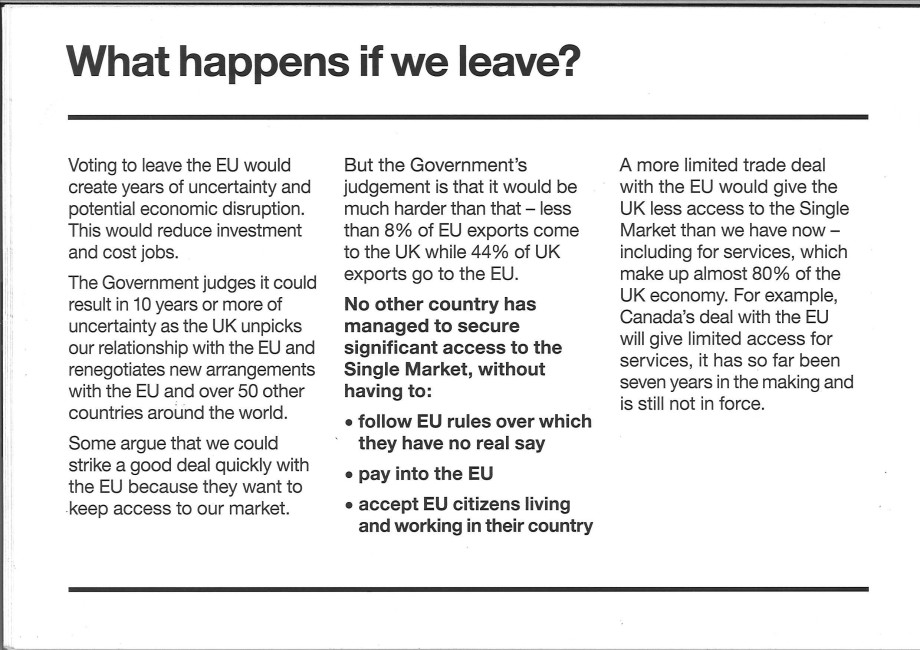
Page 8
‘Voting to leave the EU would create years of uncertainty and potential economic disruption, this would reduce investment and cost jobs.‘
This sentence is oxymoronic: if Brexit would mean so much uncertainty then how are they so certain it would be bad? But thus speaks Schrodinger’s economist … simultaneously paranoid AND clairvoyant! Uncertain about the future … but convinced it would be terrible!
It would reduce investment? Got any facts to back that up? I can demonstrate that declaring independence makes countries more prosperous because I can name lots of countries where it happened: USA, India, Canada, Australia, New Zealand, Switzerland, Norway, Iceland…
And I can demonstrate that sacrificing independence leads to social and economic decline because I can name lots of countries where it happened: France, Spain, Italy, Greece, Portugal, Austria. So you don’t have to take my word for it, because I argue using empirical evidence so you can just go onto google and type something like ‘Did Indian independence work?’ and check for yourself.
Also it was a mistake to include any claim about jobs as the EU clearly a destroys jobs on an industrial scale. EU unemployment is approximately double the G7 average.
‘The government judges it could result in 10 years or more of uncertainty as the UK unpicks our relationship with the EU and renegotiates new arrangements with the EU and over 50 other countries around the world‘
For a start there are 28 countries in the EU not ‘over 50’. Next, it is EU membership that entails a nightmarish labyrinth of technical procedure, it is independence that is a position of instant Palladian clarity. Britain would simply continue to trade under existing WTO rules.
‘Less than 8% of EU exports come to the UK while 44% of UK exports go to the EU‘
Last year year we bought £240 billion of EU stuff and they bought £150 billion of our stuff. And Britain buys more German exports than any other country.
There are two types of country in the EU: Germany, and the rest. Germany doesn’t want any disruption to its trade with its biggest export market, and the rest of the EU is in such a precarious financial position that even a tiny delay impediment to trade could be catastrophic. They would want a speedy deal out of self interest, whereas we wouldn’t be in any hurry to strike a deal because world prices are lower anyway, and importing less would save us money. Right now the EU want a trade disruption with Britain like they want a hole in the head.
‘No other country has managed to secure significant access to the Single Market without having to:
-follow EU rules over which they have no real say
-pay into the EU
-accept EU citizens living and working in their country.‘
Really? What about the USA? Canada? Japan? China? Russia? Australia? New Zealand? Brazil? Argentina? Saudi Arabia? Pretty much the whole of the rest of the world in fact…
Do those countries pay into the EU? No.
Do those countries have to accept EU citizens living in their country? No.
Do those those countries have to obey EU law? No. They are not governed by the EU. Obviously every exporter must comply with the standards of the country they are exporting to, but that is not the same as submission to external rule and it is mendacious of this leaflet to imply otherwise.
‘A more limited trade deal with the EU would give the UK less access to the Single Market than we have now‘
Again, the Single Market which we never wanted is confused with a trade area which is all we wanted.
‘…for example Canada’s deal with the EU will give limited access, it has so far been seven years in the making‘
Why do you think trade deals take a long time? Because no one gives a crap, that’s why. You can bet your life that if they had an instant transformative effect, ways would be found to conclude them quickly. A nation doesn’t need a bilateral agreement to trade, it can just buy and sell under standard, existing WTO rules, once a deal is struck the general economy incrementally adjusts to a slightly more benign path, the effects of which become apparent only in the long term. The EU trades extensively with Canada already, once the deal is concluded this will continue, just slightly differently. Big deal. Nothing so great it’s worth sacrificing independence for.
This whole conversation about trade and tariffs is an attempt to distract you from spotting the vast self-evident truth, that independent countries tend to have much higher growth and lower unemployment (G7 countries especially). It is an attempt to move the conversation away from observable facts about countries that have declared independence in the past, and turn it into a conversation about an unknowable future. Why? Because there are no facts about the future, so it allows the Remainiacs to argue using fact-free unfalsifyable pseudo-science.
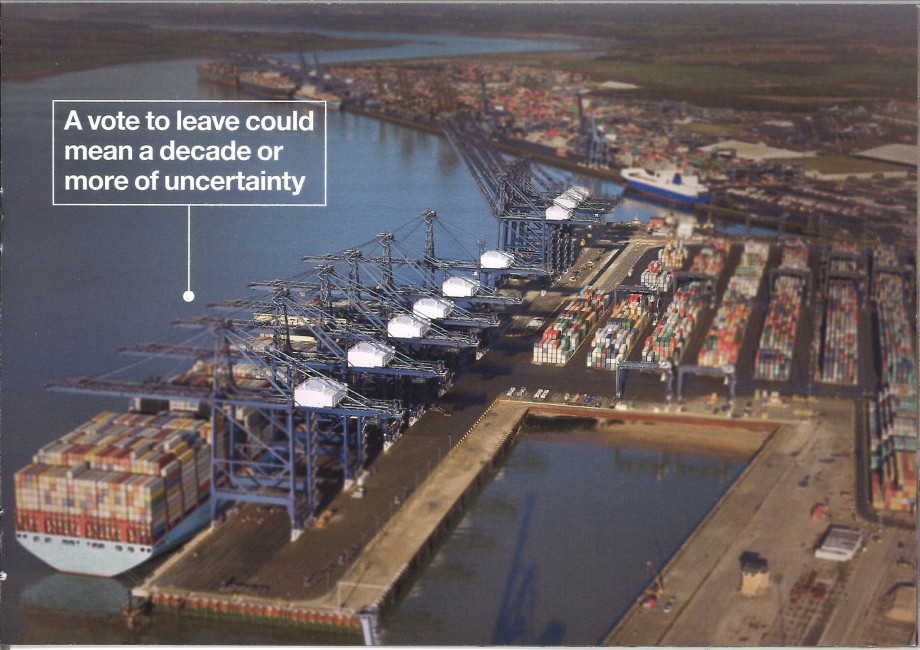
Page 9
‘A vote to leave could mean a decade or more of uncertainty‘
It could mean? … A decade or more? … Uncertainty about what what? Come on, don’t you know? I thought this was supposed to be an information booklet! I know this leaflet is light on specifics but this sentence doesn’t even manage to tell us what it’s uncertain about! Just another page of fact-free paranoia. Page 8 and 9 use the word ‘uncertainty’ three times – I think it’s time to crush project fear.
The laws of physics state that the chief characteristic of the future is that no one knows what it will be, therefore to say some future scenario would mean ‘uncertainty’ is essentially a statement of zero intellectual value. Any hypothesis about the future involves uncertainty, that’s what a hypothesis is, if we were certain about it then it wouldn’t be a hypothesis but a law of physics.
To quiver about the ‘risks of uncertainty’ makes jealous husbands of us all projecting the worst nightmare imaginable on any unknown quantity. But both sides of any choice involve uncertainty. Are the Remain side certain that an independent Britain wouldn’t simply flourish in just the same way that India, the USA, Canada, Australia, New Zealand, Norway and Switzerland have done? Are the Remain side certain that the Eurozone won’t collapse? That Turkey will not take control of the Commission? Enforce censorship? Roll back gay rights and women’s rights? and generally dictate EU social policy the way Germany dictates economic policy now? In your face project fear!

Page 10
‘The UK is not part of the European border-free zone. We control our own borders.‘
This is a repetition of the point covered on page 2.
‘The government has negotiated a deal that will make our benefits system less of a draw for EU citizens.‘
Again, this is a repeat of page 2
‘In future new EU migrants will not have full access to certain benefits until they have worked here for up to four years‘
I have emboldened all the words that make the above sentence meaningless.
-in ‘future‘? What date will it begin? Once every other state has ratified it? That basically means never.
-won’t have ‘full‘ access? Well how much access? We are never told.
-to ‘certain‘ benefits? Which ones? Some? A couple? One or two? We are never told.
-for ‘up to‘ for years? How long exactly? See how they’ve given a maximum time not a minimum?
Because this sentence does not contain one hard fact, the government could give full benefits to everyone and still claim to have honoured it. In short, if you buy it, you’re a sucker.
‘The Government will have greater powers to take action where there is abuse of our immigration system‘
You should know the drill by now, do I really have to go through this sentence to explain its mendacity? Ok I will for the hell of it…
-‘will have‘? when exactly?
-‘greater’ powers? Greater powers than what? Than the none that we have now?
-to ‘take action’? What sort of ‘action‘ do they have in mind? What are they actually going to do? We are never given specifics.
‘Some argue that leaving the EU would give us more freedom to limit immigration‘
Well obviously, declaring independence means we would govern ourselves. That’s what independence is.
‘…But in return for the economic benefits of access to the Single Market, non-EU countries – such as Norway – have had to accept the right of all EU citizens to live and work in their country‘
Norway does not have to accept free movement, they may choose to accept it, when and where they feel it is in their interests, but that is their choice, not their obligation. Norway govern themselves, so any time they decide to revise bilateral agreements they are free to do so. Has Norway’s independence been a success? Yes, Norway has no national debt and free higher education, it’s GDP per capita is 50% higher than the Eurozone’s and it’s unemployment rate is a third of the Eurozone’s. Independence works.
Can you name one country that declared independence then became poorer?
Page 10, Keeping us safer.
‘EU membership means uk police can use law enforcement intelligence from 27 EU countries, and will have access to fingerprint and DNA information.‘
We had bilateral arrangements in place to do all that before we joined. It’s called ‘Interpol’ and it was set up in 1923. If you are interested in more actual facts about Interpol here is a link to their Wikipedia page.
‘EU cooperation makes it easier to keep criminals and terrorists out of the UK‘
???? If you were a terrorist, what would you prefer, free movement or borders?
‘Since 2004, using the European Arrest Warrant over 1000 suspects have faced justice in UK courts’
What? Over 12 years we have imported 1000 criminals? What were they doing here?
‘…and over 7,000 have been extradited‘
What? So foreign governments have the power to seize British citizens and put them on trial? And if they are not British citizens, then what were they doing here in the first place? How did they manage to enter?

Page 11.
This page simply repeats the statement that begins page 10
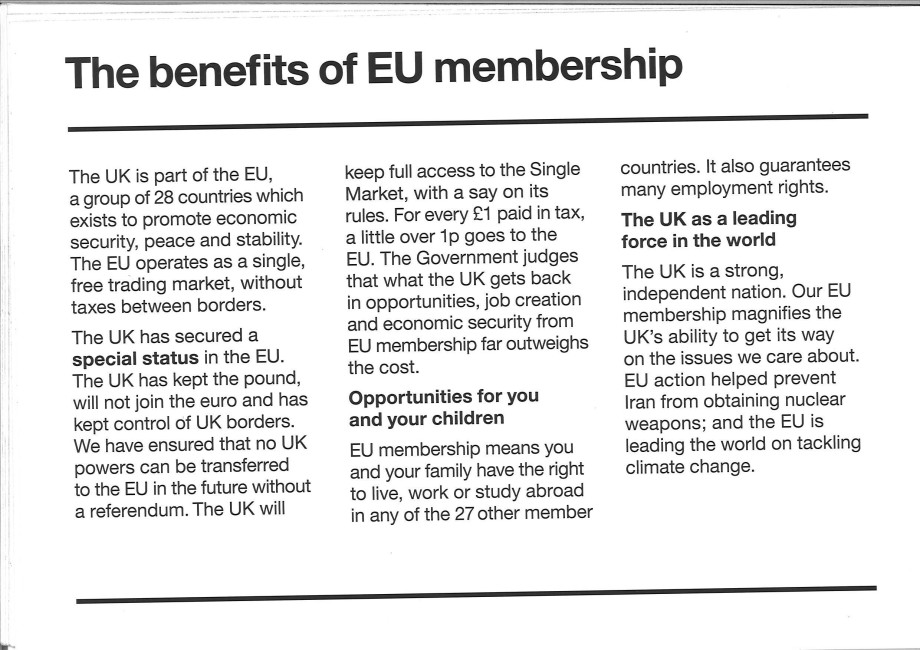
Page 12
‘The UK is part if the EU, a group of 28 countries which exists to promote economic security, peace and stability.‘
No, the EU exists to integrate. Integration is what the EU does. The clue is in the title, it’s called the European Union. It’s mission is to eradicate nation states and homogenize multicultural Europe into a monocultural trade cartel.
It promotes economic security? For who?
The claim that ‘the EU has given us peace’ is a serious claim and deserves a serious response.
The Second World War ended in 1945. In 1957 six countries signed the Treaty of Rome. There are now 28 countries in the EU. There are about 50 countries in Europe. But the EU claims credit for ALL the peace, enjoyed by ALL of Europe since 1945! So they are claiming credit for things that happened beyond their boarders, before the EU even existed, to which they have made no contribution! This is the classic EU strategy of claiming credit for everything good that has happened in the modern world, whilst simultaneously denying any culpability for the Yugoslavian ethnic cleansing or the massacres in Paris or Brussels. Do those deaths somehow not count?
Next if we refer to the Steven Pinker book ‘The Better Angels of our Nature – Why Violence Has Declined’ we see that the decline of war between nation states is common to the whole world, not exclusive to Europe. In the modern world, war is not about nation states any more, it’s about religion. Every country between Nigeria and China is involved in a military conflict, every one of those conflicts is about religion. Take the religious wars out of the equation and the the human race is more or less at peace. The EU claims to have ended war even as Greece is crushed and religious barbarism advances – they make a desert and call it peace.
“Europe brings peace? Is that so? It is becoming obvious you cannot have the economics of the Great Depression without the politics of the Great Depression” – Nick Cohen
‘The EU operates as a single, free trading market, without taxes between borders‘
Yes. That’s the whole problem. Without borders there is no correlation between votes and power.
‘The UK has secured a special status in the EU. The UK has kept the pound, will not join the euro and has kept control of UK borders.‘
This is just a repetition of points on page 2.
‘We have ensured that no UK powers can be transferred to the EU in the future without a referendum‘
But they have been transferred already – over the next ten years European judges will just rule again and again that under the Lisbon Treaty all sovereignty is against trade law.
‘The UK will keep full access to the Single Market, with a say on it’s rules‘
Again ‘Single Market’ deliberately confused with trade area. We would trade with these markets anyway under standard WTO rules that already exist. We are free to comment on EU rules (anyone in the world is) but we are not actually writing the rules by which we live, and if we don’t like the rules that are written, we are powerless to change them. If Britain has any influence at all in the EU then how come Cameron’s negotiation didn’t win any repatriation of power?
‘For every £1 collected in tax a little over 1p goes to the EU.‘
Payments to the EU are currently £350 million per week and rising exponentially, and that’s not including the additional payments Alistair Darling and George Osborne made to bail out the euro. If we didn’t make these payments to the EU we could afford reverse all the austerity savings and still have money left over to reduce the deficit. But even that is not the point, countries that govern themselves tend to pass better written law, design more functional social institutions and consequently become more prosperous, so even if EU membership was free we would still be better off leaving because we would again be able to successfully adapt our laws and institutions to the modern world.
Here is the proof that Britain’s growth was double before we sacrificed our independence in 1973:
Britain’s GDP per capita:
1948 to 1973 = 2.35%
1974 to 2001 = 1.87%
2001 to 2015 = 1.1%
‘The Government judges that what the UK gets back in opportunities, job creation and economic security from EU membership far outweighs the cost.‘
No they don’t. David Cameron does, George Osbourne does, but the Government collectively does not. This sentence seeks to create the impression that support for the EU is monolithic, it is support for independence that is monolithic amongst all people in possession of clear facts and the faculty of reason.
Supporters of EU membership fit within the following descriptions:
1, Interested people who are not to be trusted.
2, weak people who will not change.
3, stupid people who cannot change.
4, a final small group of moderate people who indulge failure with excessive patience.
Besides if membership gives us so much employment, opportunity and prosperity then how come debt, inequality, terrorism and pollution have increased? How come growth has halved and unemployment has risen from 3.7% to 5.1%? But hey, I suppose all bad changes are absolutely nothing to do with the EU….
‘EU membership means you and your family have the right to live, work or study abroad in any of the other 27 member countries. It also guarantees many employment rights.‘
Obviously any rights the EU gives you to live and work there, it also gives them to live and work here. Which people do you suppose are the most likely to take advantage of this right? Obviously the people in states with high unemployment.
‘The UK is a strong independent nation.‘
Not true. An independent nation is one that governs itself and which can renegotiate any bilateral agreements it may have as and when it chooses. Britain has therefore become progressively less independent since it joined the EEC in 1973. Britain is strong? Our nation has clearly declined. List British institutions and ask yourself which ones are better than they were in 1973. The NHS? The welfare state? Council housing? Higher education? The army, navy or air force? The Lords? Manufacturing? Fishing? The steel industry? Since 1973 what has been been successfully reformed that could not have been reformed independently? Examples?
‘Our EU membership magnifies the UK’s ability to get its way about issues we care about‘
Aha! An admission that it’s about us getting our way! Well I am repulsed by this craven desire to control others – it is arrogant to tell others how to live and it is pathetic to be told how to live.
‘EU action helped prevent Iran from obtaining nuclear weapons‘
It is absolutely shameful that we continue to trade with authoritarian militarized states. Our sanctions against Iran were pathetic and since abandoning them Iran has recommenced its nuclear program with renewed vigour. Britain shut down its coal mines because we didn’t want to be dictated to by Arthur Scargill, but then started buying fuel produced by regimes like Russia and OPEC who are infinitely more authoritarian than the NUM – ultimately we are subsidising a low-level war against ourselves! Clearly the solution is to pass an energy reform act switching all energy production to renewables within a decade. That would help bankrupt they fuel-selling tyrants. But since 1973 the only great reform acts we have passed have been about trade and commerce. My full rant about that is here.
‘The EU is leading the world on tackling climate change‘
Well the question of why the EU fails on the environment could be a whole essay in itself, but imagine this…
Imagine if 40 years ago you had told me that Europe’s population would decline, and that there would be a proliferation of environmental legislation, and that engineers would develop much more efficient engines, and better insulations, and that we would manufacture less and buy and sell information more and that the internet would reduce the need for travel or moving things around? If 40 years ago you had told me all those things then I would have said “yippee, that will surely mean less pollution!” But pollution increased. Why?
The father of modern environmentalism was the German economist E.F. Schumacher who wrote Small is Beautiful where he set out that we should protect nature by ‘thinking globally and acting locally’ but that is the exact opposite of what modern politics is about. Instead of acting locally modern politicians talk internationally which automatically divorces votes from power.
Think about the word international (inter-national) a nation state is a holistic legal and cultural entity so any inter-national agreement automatically moves decisions about people’s lives away from voters to rarefied heights beyond democratic scrutiny. So however well intended, inter-national negotiations tend to result in bad law that is difficult to successfully reform. Consequently you end up with an EU that signs the Kyoto Protocol but then fails fails to meet its targets, and which says great things about protecting nature whilst redoubling their destruction of it.
The sort of great reform acts that we need are the sort of visionary reform acts we passed when we were independent, like the Town and Country Planning Act that protected the green belt and the Clean Air Act of 1956. What planet Earth does not need is a pseudo-ecological EU that spews out eco-babble-legislation whilst behind the scenes neo-liberal industrialists tell the commission what laws they want.
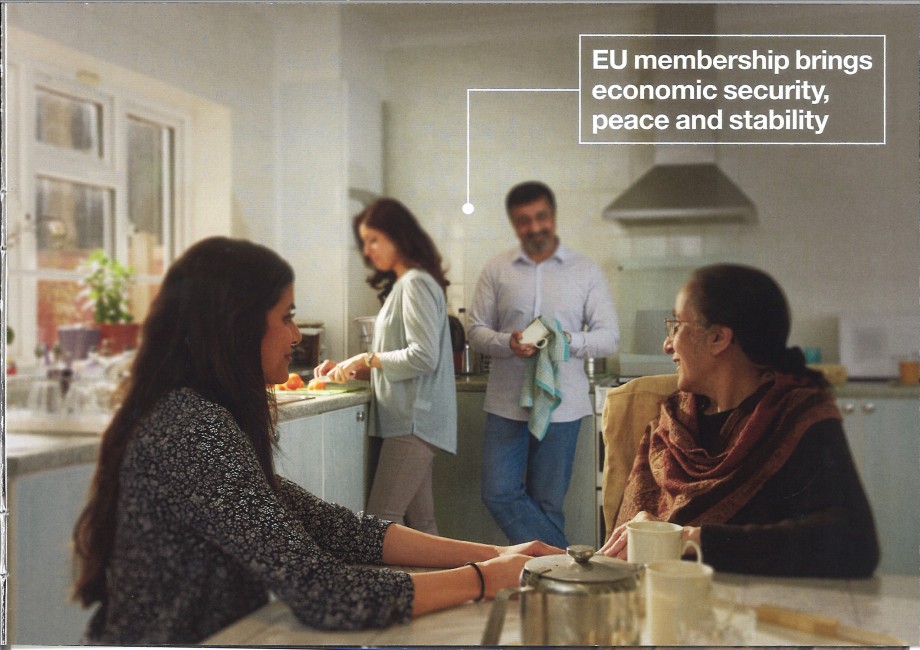
Page 13
This is just a repetition of the first sentence on page 12.
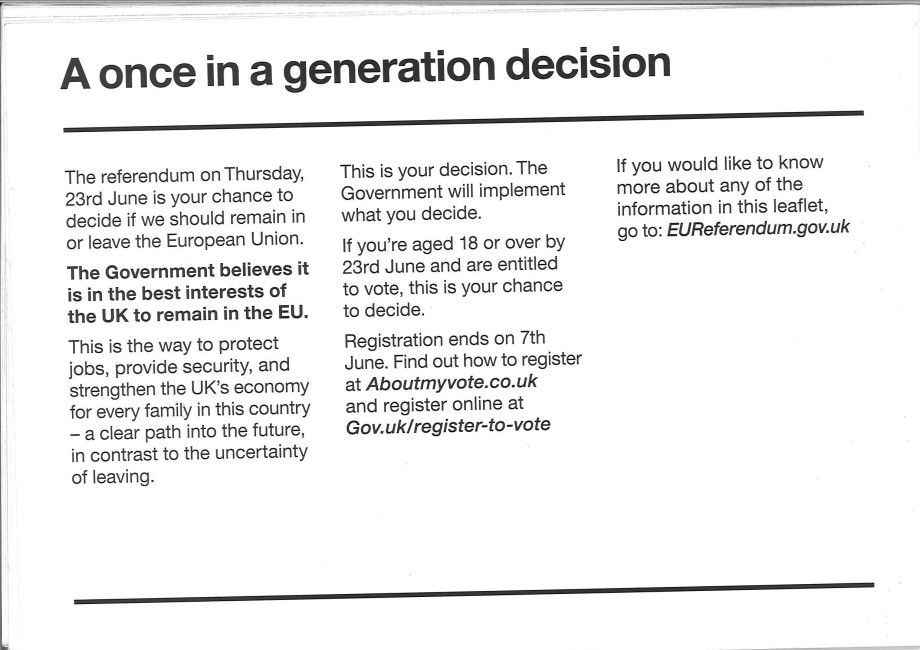
Page 14, column 1.
This page begins by telling us the date of the referendum for the 4th time (project fear is scared) It then repeats in bold (for the 7th time) that ‘the Government’ thinks we should vote to remain. This column ends with another paragraph of fact-free conjecture about how remaining would be all sweetness and light, whilst independence would usher in the four horsemen of the apocalypse. The word ‘uncertainty’ is used for the fourth time.
Page 14, column 2.
‘This is your decision. The government will implement what you decide.‘
Finally, a sentence that is factually correct! The date of 23rd June is then mentioned for a 5th time for good measure. The rest is about registration.

Page 15
‘The EU referendum is a big decision for you and your family’s future‘
My italics. Note how they remind us it’s a ‘big decision’ for who? Not just you, but ‘you and your family’. And just in case they haven’t pressed enough fear buttons an emotive picture of a couple with a young baby is thrown in right at the end just to ramp up the anxiety at the finale. In Britain’s finest hour the Government made posters saying ‘Keep calm and carry on’ today they make leaflets saying ‘Live in fear and let us carry on’

Page 16
The emblem of HM Government is once again misappropriated.
Then we are reminded (for the 8th time) that the government thinks that remaining is best. It writes this in bold and underlines it just in case you missed it before.
It then restates the lie that EU membership protects jobs when Eurozone unemployment is double that of the UK, USA, Switzerland, Norway, Iceland, Canada, Australia, New Zealand etc…
It then restates the lie that EU membership means a stronger economy even though UK GDP per capita is half what it was before 1973.
It then restates the lie that EU membership provides security, when the EU has never stood for peace, has never faced down any tyrant, bankrolls fascism in Turkey, grants free movement to terrorists and freely trades with dictatorships.
Page 16 then repeats (again) what a big important decision this is – then again it’s only natural the establishment should fear change.
Page 16 then repeats (for the 9th time!) that the government thinks we should remain – just in case you forgot since they told you at the top of the page.
And is that the end of the booklet? Not quite. They then tell us (for a 6th time) it’s on June 23rd.
June 23rd. Got that?
Conclusion.
So basically we see that throughout this booklet a small number of points are repeated again and again. There are lots of general opinions which seem impressive at first but which on inspection contain no specifics. Again and again we are presented with unfalsifyable conjecture about the future rather than empirical evidence. Its just an orgy of paranoia.
If today Britain were a normal independent nation there would be no question of us voting to join this well intended but deeply dysfunctional political organisation. So I would urge you to do what worked so well for India, the USA, Canada, New Zealand, Norway, Switzerland, Iceland and Australia and vote for independence.
P.S. I am indebted to Chris Arning and Paul Perrin for their help.
(P.P.S. the referendum is on June 23rd)
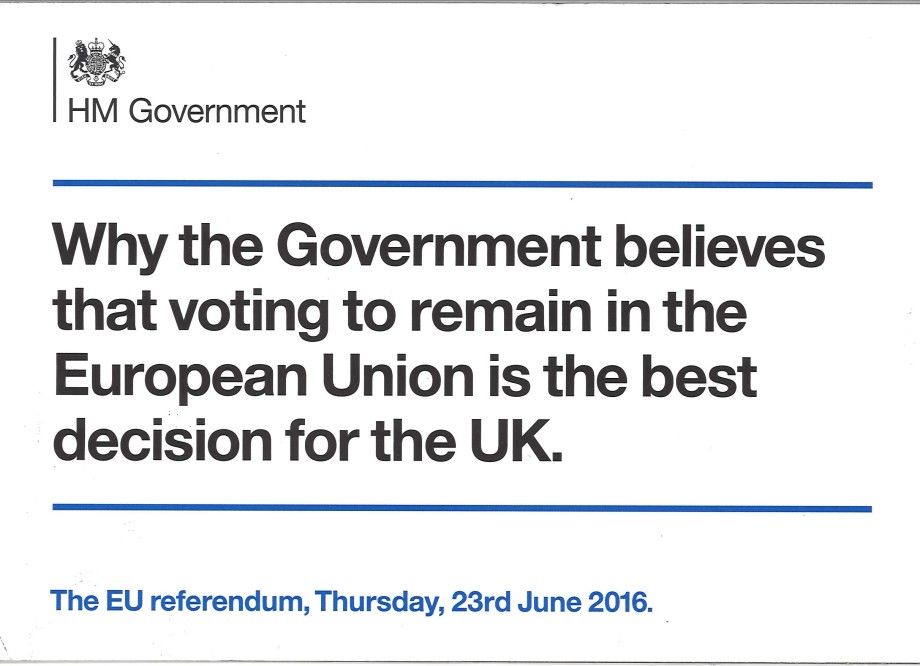
Excellent page by page analysis with lots of factual and practical comments/comparisons. For me the only thing missing is foresight or the ability to read between the lines and challenge the unwritten. 8 or 9 out of 10 though!
LikeLike
Yikes! People are reading it already! I had better finish it tomorrow! Please don’t share till I iron out the problems, thanks!
LikeLiked by 1 person
This was a very informative read, having made up my mind to vote out, I have felt for years that the EU is out of control and without any form of redress
LikeLike
Seriously.
I refused to red anything after the Politicise theonarchy statement.
Like it or loathe it, it is Her Majesty’s Government. Her
Majesty’s Government’s position on this referendum is to remain in. Fact.
Whether the whole majority of the party in Government support that view or not is a moot point. Your premise is to “debunk” . You can not do that whilst commiting the same errors as those.you.seek to “debunk”
Still an out voter despite your abject failure.
LikeLike
Although I disagree I warmly congratulate you on getting the big decisions right!
LikeLike
It makes good counter arguments. Find and correct the spelling errors and it would be more authoritative. Thanks.
LikeLiked by 1 person
I do think you ought to run through it and correct the mis-spelling of ‘borders’…You’ve spelt it ‘boarders’…Or was it a Freudian slip?
LikeLike
Thank you for de-bunking the spelling! I am rather dyslexic and the Pages program I write on doesn’t seem to have a spell check. Hope you weren’t board by the essay!
LikeLike
Sorry, but “Again and again we are presented with unfalsifyable conjecture about the future rather than empirical evidence” – is completely nonsensical and calls into question your whole premise.
How can anyone have empirical evidence about the future in economic and social terms? Well, you can’t. So the best alternative is to forecast, based on existing knowledge and models. And this is what has been done – showing that on balance the British economy will be damaged by a leave. The degrees of damage depend on many things, but the upsides are tenuous and even more far fetched than the worst-case scenarios. Fine, don’t believe the masses of evidence from respected national and international scientists, economists and think tanks. Don’t consider the mass of evidence, which is what science recommends, and cherry pick a couple of outlying studies. But don’t go telling me it is about a lack of empirical evidence about the future!
In my opinion you are being wilfully ignorant of the facts, and relying on little more than your sense of intuition and a proverbial crystal ball. My opinion – leaving is a mistake for many more reasons than just the economic ones (though those are compelling, of course). The political ones – seeing the country ruled over by some of the nastiest, xenophobic and close-minded people in British society – are ample for voting to remain. I want an open society, open to the world, and working together to solve common problems. This is what it means to remain.
LikeLike